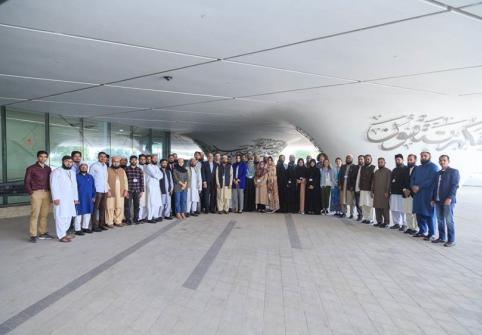News
HBKU College of Islamic Studies Hosts Madrasa Winter School
06 Jan 2020Course equips future religious leaders with tools to contribute to Islamic thought

The College of Islamic Studies (CIS), part of Hamad Bin Khalifa University (HBKU), hosted a Winter Intensive School as part of the Madrasa Discourses Project in collaboration with the University of Notre Dame in Indiana, United States. The Winter Intensive, open to Madrasa graduates from India and Pakistan, took place from December 25-30, 2019 in Doha.
The Madrasa Discourses Project aims to equip future religious leaders with the tools to confidently debate and contribute to Islamic thought within the contemporary global context. The collaborative has a direct impact on how Islam is taught in the Indian subcontinent. Forty-four students took part in the School, which is one of two yearly meetings of the group. Throughout the rest of the year, students also attend intensive training through videoconferencing. The full program extends over a three-year period and provides students an opportunity to engage in guided readings and open debate on contemporary societal and global issues.
This year’s theme was ‘An Encounter of Western and Muslim Humanities: Science, Hermeneutics, Tolerance’. Over the five-day workshop, faculty members for the program, Dr. Ebrahim Moosa, University of Notre Dame, USA; Dr. SherAli Tareen, Franklin and Marshall College, USA; Dr Waris Mazhari, Jamia Hamdard, India; Dr. Ammar Khan Nasir, Al Shairia Academy, Pakistan; and Dr. Josh Lupo, University of Notre Dame and guest lecturers Dr. Sohaira Siddiqui, Georgetown University School of Foreign Service in Qatar; Dr. Rana Dajani, Hashemite University, Jordan; and Dr. Idrees Azad, International Islamic University, Pakistan presented and discussed topics such as the history of science, tolerance, epistemology, evolution, and more. Participants had the chance to engage in discussions following lectures, posing critical questions about the past and future of Islam in South Asia. In addition, students had the opportunity to visit the National Library of Qatar, the Slavery Museum and the Museum of Islamic Art.
On the impact of the program, Ebrahim Moosa said: “We have witnessed a vast transformation in the two previous cohorts of Madrasa Discourses. This means that after two years the participants ask deeper and more complex questions. Many find the return to tradition both exhilarating and challenging since it also involves engaging with contemporary knowledge in Muslim religious thought. This is part of some of the most gratifying work I am doing in my career. On the ground in both India and Pakistan, participants are confidently posing new questions to solve difficult matters such as blasphemy, along with other issues.”
CIS continues to support transformative programs such as the Madrasa Discourses Project that contribute real-time change in the field.
